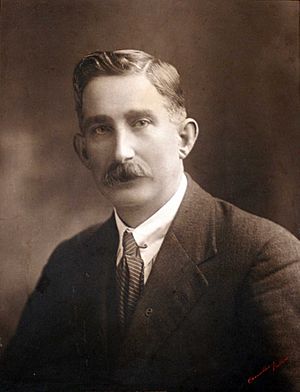Frank Lawless facts for kids
Quick facts for kids
Frank Lawless
|
|
|---|---|
 |
|
| Teachta Dála | |
| In office May 1921 – 16 April 1922 |
|
| Constituency | Dublin County |
| In office December 1918 – May 1921 |
|
| Constituency | Dublin North |
| Personal details | |
| Born | 10 October 1870 Saucerstown, Dublin, Ireland |
| Died | 16 April 1922 (aged 51) Dublin, Ireland |
| Political party | Sinn Féin |
| Children | 11 |
| Military service | |
| Branch/service | Irish Republican Army |
| Battles/wars | |
Frank J. Lawless (born October 10, 1870 – died April 16, 1922) was an important Irish leader. He was a farmer from Saucerstown in County Dublin. He was also a politician who worked for Sinn Féin, an Irish political party. He served as a Teachta Dála (TD), which is like a member of parliament, for North Dublin from 1919 to 1922. Frank Lawless was an early member of Sinn Féin and the Gaelic League, which worked to promote the Irish language and culture.
Contents
Early Life and Revolutionary Actions
Frank Lawless was involved in the 1916 Easter Rising. This was a major event where Irish rebels tried to gain independence from British rule. He was the second-in-command to Thomas Ashe during a battle in Ashbourne, County Meath. Two of his sons also fought in this uprising.
Imprisonment and Release
After the Easter Rising, Frank Lawless was sentenced to a long time in prison. However, his punishment was changed to ten years. He was held in Lewes prison with another famous Irish leader, Harry Boland. He was set free in 1917 as part of a general amnesty, which means a pardon for political prisoners.
He was arrested again later for political reasons and held in Usk prison. He was allowed to leave prison temporarily to take part in the 1918 election. He returned to Usk prison on the same day. After being released from Usk, he was held in Ballykinlar Camp, another place where political prisoners were kept.
The Battle of Ashbourne
Frank Lawless played a key role in the Battle of Ashbourne. This was a victory for the Irish Volunteers, a group fighting for Irish independence. They defeated a larger number of RIC (police) officers. This battle was part of a bigger plan to start rebellions outside of Dublin during Easter Week.
Political Career
In the 1918 Irish general election, Frank Lawless was elected as a Sinn Féin TD. Sinn Féin won many seats in this election. He defeated a long-serving politician named J. J. Clancy. Like other Sinn Féin members, Lawless did not take his seat in the British Parliament. Instead, he joined the first First Dáil, which was Ireland's own revolutionary parliament.
He was re-elected in 1921 to the Second Dáil for the new Dublin County area. In January 1922, he voted to approve the Anglo-Irish Treaty. This treaty led to the creation of the Irish Free State.
Later Life and Legacy
Frank Lawless passed away just three months after the treaty vote. He was 51 years old. He died from injuries after the small horse-drawn cart he was riding in accidentally overturned. He was buried with full military honors at Killossery Cemetery in Rolestown. His funeral was one of the last times that two other important Irish leaders, Michael Collins and Éamon de Valera, were seen together. Frank Lawless was married and had eleven children, six sons and five daughters.
 | Misty Copeland |
 | Raven Wilkinson |
 | Debra Austin |
 | Aesha Ash |

